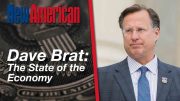
The White House said,
The administration believes that, at a time when it is working with the Congress on proposals to reduce federal deficits, the nation cannot afford to maintain these wasteful subsidies.
White House spokesman Jay Carney said that Republicans were more interested in protecting Big Oil’s tax breaks than “finding more responsible ways to spend that money,” calling them “unwarranted subsidies.”
Senate Majority Leader Harry Reid joined the parade, declaring, “Instead of defending oil companies, Republicans should be defending the American taxpayer.” Senator Claire McCaskill (D-Mo.) expanded on the topic: “This is just another piece of the puzzle that we need to get at as we try to take away taxpayers subsidies to Big Oil." Senator Al Franken (D-Minn.) put in his two-cents' worth: “We have to stand up and say, ‘Enough is enough.’ While oil prices are gouging the pocketbooks of American families, these companies are on a pace for a record profit this year. ”
The New York Times also misrepresented the tax breaks: "These subsidies are clearly unnecessary, and returning $2 billion to the Treasury would be a good thing." Finally, even the President himself could not resist the temptation to confuse the issue of subsidies and tax breaks: “These tax giveaways aren’t right. They aren’t smart. And we need to end them.”
The echo chamber of the mainstream media and liberal Democrats merely confirms their attempt to confuse the issue to promote their agenda. Subsidies and tax breaks are different entities entirely, and getting the terms wrong means getting it all wrong.
Writing for The Freeman, Sheldon Richman explains:
A subsidy is a cash grant from the government…. They are direct transfers from the taxpayers to the beneficiaries….
[This] government intervention enables people to obtain money they were not entitled to; the flip side is that someone else is deprived of money he is entitled to.
On the other hand, a tax break allows the owner of the money to keep more of his own money for his own personal use. As Richman explains:
When someone is given any kind of “tax break,” he keeps money that he is entitled to…. Thus, if a person retains some of his own money because of a government action, we should not condemn this as a subsidy.
Exxon’s chairman and CEO Rex Tillerson attempted to defend the tax breaks allowed to his company under the law, noting that raising taxes (removing the tax breaks) would result in lower overall tax revenues for the government. Taxes, he said, are one of several factors the company looks at when making a decision on where best to invest company money, and if tax costs go up, that reduces the opportunities for the company to discover and develop new energy resources.
Also, as noted by Ken Cohen at Exxon’s website, “A tax hike isn’t going to bring down gas prices.”
Oil companies don’t have the ability to control the price of crude oil (which is the single-largest component of the price at the pump).
Oil companies aren’t able to control global events that account for fluctuations in the marketplace.
And, oil companies aren’t able to control the value of the U.S. dollar, which is weak and [is] a factor in rising commodity prices across the board.
But what oil companies are able to do is invest in new energy supplies — if the policy [and tax] environment allows them to.
And the development of new energy supplies would ultimately bring down the cost of gasoline — it’s a simple case of supply and demand. At lower prices, more gas will be sold, increasing oil companies’ revenues, and ultimately, government revenues through taxes.
Understanding the difference between a subsidy (theft and transfer of stolen goods) and a tax break (allowing the owner to keep more of his property), certainly clarifies the issue. Senators playing the “wasteful subsidy” game are seeking short-term benefit from uninformed voters in their districts. Others, like Energy Secretary Steven Chu, have a much different agenda: driving the price of gasoline as high as possible so that inefficient “green” initiatives can compete.
In testimony before the House Subcommittee on Energy and Water Development on March 15, Chu made that abundantly clear:
The President’s budget makes tough choices, cutting in many areas while recognizing that we must invest in strategic areas like clean energy….
[Our efforts] will provide a clear, long-term signal to industry to bring capital off the sidelines and into the clean energy sector.
[We intend to fund these efforts] by cutting back in multiple areas, including eliminating unnecessary fossil fuel subsidies.
In other words, the Obama administration and the Democrats want to use the money that is currently considered as “wasteful subsidies” to the oil companies and use that instead to provide wasteful subsidies to inefficient green initiatives.



